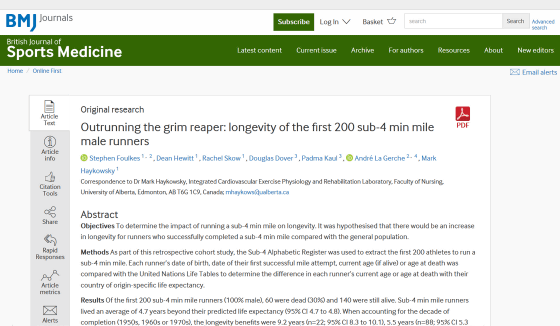Elite runners who break the four-minute mile barrier live longer than the average person

It is said that moderate running is good for your health, but on the other hand, there are also opinions that running too hard or exercising too much can actually be harmful to your health. In a survey of 200 elite runners who had previously achieved the '
Outrunning the grim reaper: longevity of the first 200 sub-4 min mile male runners | British Journal of Sports Medicine
https://bjsm.bmj.com/content/early/2024/05/05/bjsports-2024-108386

Elite Runners Live Years Longer Than the Average Person, Scientists Find : ScienceAlert
https://www.sciencealert.com/elite-runners-live-years-longer-than-the-average-person-scientists-find
While many studies have shown that exercise reduces the risk of death , it is unclear whether pushing one's body beyond what is recommended for the general public, as athletes do, is good or bad for one's health. Some scientists suggest that the lifestyle of athletes who participate in high-intensity competitions such as marathons and triathlons may put excessive stress on the heart and increase the risk of early death.
So a research team from the University of Alberta in Canada conducted a study on 200 top runners who had broken the 4-minute mile barrier. The 4-minute mile barrier had long been a high wall in the history of human athletics, but in 1954, British athlete Roger Bannister was the first to break the 4-minute mile barrier, and since then, runners have rapidly broken the 4-minute mile barrier. As of June 2022, a total of 1,755 runners have broken the 4-minute mile barrier.
Runners who can run a four-minute mile are a unique group of people with optimized respiratory, cardiovascular, metabolic and musculoskeletal systems, and to maintain this speed, runners must engage in regular, high-intensity training.

The team extracted data from the first 200 runners to break the four-minute mile, looked at each runner's date of birth, age at time of study, and age at death, and compared the average life expectancy in each runner's country of origin. The first 200 runners to break the four-minute mile ran from the 1950s, when Bannister first ran the mile, through the 1970s, and 60 of them had died at the time of the study.
The analysis confirmed that the first 200 people to break the four-minute mile lived on average about five years longer than the general population. The difference in life expectancy between the general population and runners varies by age group, with runners who achieved the feat in the 1950s living 9.2 years longer than average, runners who did so in the 1960s living 5.5 years longer, and runners who did so in the 1970s living 2.9 years longer. Bannister, the first man to break the four-minute mile, died in 2018 at the age of 88, about nine years longer than the average life expectancy of a British man, which is 79 years.
The researchers suggest that this result may be due to improvements in life expectancy in the general population, narrowing the gap between the life expectancy of elite runners and the general population. They also note that among the first 200 people to run a sub-four-minute mile, there were 20 pairs of siblings or parents and children, suggesting that athletes may have genes that are advantageous for longevity.

'Runners who can run a sub-4-minute mile live longer than the general population, challenging the notion that extreme endurance exercise is detrimental to longevity,' the researchers said.
Related Posts:
in Science, Posted by log1h_ik







